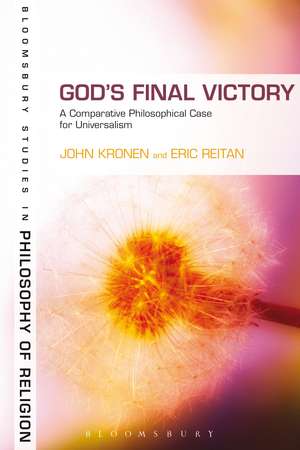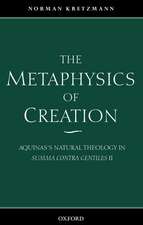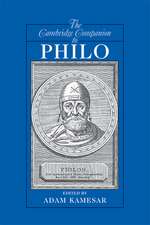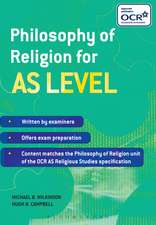God's Final Victory: A Comparative Philosophical Case for Universalism: Bloomsbury Studies in Philosophy of Religion
Autor Professor John Kronen, Professor Eric Reitanen Limba Engleză Paperback – 5 iun 2013
Din seria Bloomsbury Studies in Philosophy of Religion
- 30%
 Preț: 527.07 lei
Preț: 527.07 lei - 22%
 Preț: 224.66 lei
Preț: 224.66 lei - 19%
 Preț: 191.38 lei
Preț: 191.38 lei - 13%
 Preț: 254.19 lei
Preț: 254.19 lei - 22%
 Preț: 232.90 lei
Preț: 232.90 lei - 12%
 Preț: 234.38 lei
Preț: 234.38 lei -
 Preț: 258.42 lei
Preț: 258.42 lei - 13%
 Preț: 255.84 lei
Preț: 255.84 lei - 13%
 Preț: 224.58 lei
Preț: 224.58 lei - 31%
 Preț: 830.20 lei
Preț: 830.20 lei -
 Preț: 257.03 lei
Preț: 257.03 lei -
 Preț: 259.42 lei
Preț: 259.42 lei -
 Preț: 254.93 lei
Preț: 254.93 lei - 21%
 Preț: 216.52 lei
Preț: 216.52 lei - 23%
 Preț: 190.50 lei
Preț: 190.50 lei - 23%
 Preț: 192.30 lei
Preț: 192.30 lei - 23%
 Preț: 191.22 lei
Preț: 191.22 lei
Preț: 257.50 lei
Preț vechi: 331.20 lei
-22% Nou
Puncte Express: 386
Preț estimativ în valută:
49.28€ • 51.26$ • 40.68£
49.28€ • 51.26$ • 40.68£
Carte tipărită la comandă
Livrare economică 14-28 aprilie
Preluare comenzi: 021 569.72.76
Specificații
ISBN-13: 9781623568498
ISBN-10: 1623568498
Pagini: 256
Ilustrații: black & white illustrations
Dimensiuni: 155 x 231 x 13 mm
Greutate: 0.36 kg
Editura: Bloomsbury Publishing
Colecția Bloomsbury Academic
Seria Bloomsbury Studies in Philosophy of Religion
Locul publicării:New York, United States
ISBN-10: 1623568498
Pagini: 256
Ilustrații: black & white illustrations
Dimensiuni: 155 x 231 x 13 mm
Greutate: 0.36 kg
Editura: Bloomsbury Publishing
Colecția Bloomsbury Academic
Seria Bloomsbury Studies in Philosophy of Religion
Locul publicării:New York, United States
Caracteristici
Draws significantly on the neglected philosophical writings of Protestant Orthodox and 19th century theologians.
Notă biografică
John Kronen is Professor of Philosophy at the University of St. Thomas, St. Paul, USA. He specializes in metaphysics and the philosophy of religion and is the co-translator, with Jeremiah Reedy, of Suarez's Metaphysical Disputation XV, On the Formal Cause of Substance (2000).Eric Reitan is Professor of Philosophy at Oklahoma State University, USA. He specializes in ethics and the philosophy of religion and has published extensively in these areas. His book, Is God a Delusion? A Reply to Religion's Cultured Despisers (2009) was named a Choice Outstanding Academic Title of 2009.
Cuprins
Chapter I: Introduction / Chapter II: Hellisms: The Species of DH / Chapter III: Universalisms: The Species of DU / Chapter IV: Universalism and the "Plain Sense" of Scripture / Chapter V: A Prima Facie Case for DU / Chapter VI: Hell and Justice / Chapter VII: The Argument from Efficacious Grace / Chapter VIII: Freely Chosen Universal Salvation / Chapter IX: Final Concerns / Bibliography / Index
Recenzii
"The authors controversially argue that, in the light of fundamental Christian doctrine, the view that all are saved is more reasonable than any view on which some are not. This is the state of the art of argument in support of universalism, and should be taken into account in any discussion of it." -- Keith E. Yandell, Julius R. Weinberg Professor, Philosophy Department, University of Wisconsin-Madison, USA
'...The overall quality of the work overshadows any critique of form. The historical breadth and depth of analysis will make this volume helpful for researchers and for graduate-level courses in philosophy of religion.'-Choice Magazine
"In their comparative case for Christian universalism entitled God's Final Victory, John Kronen and Eric Reitan display an exhaustive knowledge of the relevant philosophical and theological literature; and even though they make no claim of completeness for their study, they may in fact have produced the most complete discussion to date of the relevant philosophical and theological issues. No philosopher or theologian who in the future addresses the issue of universalism will be able to ignore the arguments of this book, and even many parishioners in the pew, however impatient they may be with finely drawn philosophical distinctions, will benefit greatly from it. The final chapter in particular will be of interest to the Christian community as a whole, because it includes an easy to digest summary of the overall argument and also addresses the issue of evangelism as well as other practical Christian concerns.The book's most important contribution to the contemporary discussion lies in a sustained and powerful critique of the so-called Argument from Freedom, the argument that, for all we know, God cannot save all sinners without violating their freedom in inappropriate ways. Kronen and Reitan demonstrate first how, given the traditional Christian understanding of his nature, God is in a position to confer efficacious grace on anyone, or on any combination of persons, without violating the rational autonomy of any individual. But they also have an additional surprise, albeit one that Reitan has articulated in previous papers, for those who insist that salvation requires an undetermined libertarian free choice that could have gone the other way. For as they also argue, the assumption that sinners retain their libertarian freedom indefinitely together with the Christian doctrine of the preservation of the saints yields the following result: We can be just as confident that God will eventually win over all sinners (and do so without causally determining their choices) as we can be that that a fair coin will land heads up at least once in a trillion tosses. One can hardly expect everyone to find such arguments as persuasive as I do; but even those who remain unpersuaded will at least find in them a formidable challenge to be met." -- Thomas Talbott, Professor Emeritus of Philosophy, Willamette University, USA
'...The overall quality of the work overshadows any critique of form. The historical breadth and depth of analysis will make this volume helpful for researchers and for graduate-level courses in philosophy of religion.'-Choice Magazine
"In their comparative case for Christian universalism entitled God's Final Victory, John Kronen and Eric Reitan display an exhaustive knowledge of the relevant philosophical and theological literature; and even though they make no claim of completeness for their study, they may in fact have produced the most complete discussion to date of the relevant philosophical and theological issues. No philosopher or theologian who in the future addresses the issue of universalism will be able to ignore the arguments of this book, and even many parishioners in the pew, however impatient they may be with finely drawn philosophical distinctions, will benefit greatly from it. The final chapter in particular will be of interest to the Christian community as a whole, because it includes an easy to digest summary of the overall argument and also addresses the issue of evangelism as well as other practical Christian concerns.The book's most important contribution to the contemporary discussion lies in a sustained and powerful critique of the so-called Argument from Freedom, the argument that, for all we know, God cannot save all sinners without violating their freedom in inappropriate ways. Kronen and Reitan demonstrate first how, given the traditional Christian understanding of his nature, God is in a position to confer efficacious grace on anyone, or on any combination of persons, without violating the rational autonomy of any individual. But they also have an additional surprise, albeit one that Reitan has articulated in previous papers, for those who insist that salvation requires an undetermined libertarian free choice that could have gone the other way. For as they also argue, the assumption that sinners retain their libertarian freedom indefinitely together with the Christian doctrine of the preservation of the saints yields the following result: We can be just as confident that God will eventually win over all sinners (and do so without causally determining their choices) as we can be that that a fair coin will land heads up at least once in a trillion tosses. One can hardly expect everyone to find such arguments as persuasive as I do; but even those who remain unpersuaded will at least find in them a formidable challenge to be met." -- Thomas Talbott, Professor Emeritus of Philosophy, Willamette University, USA













